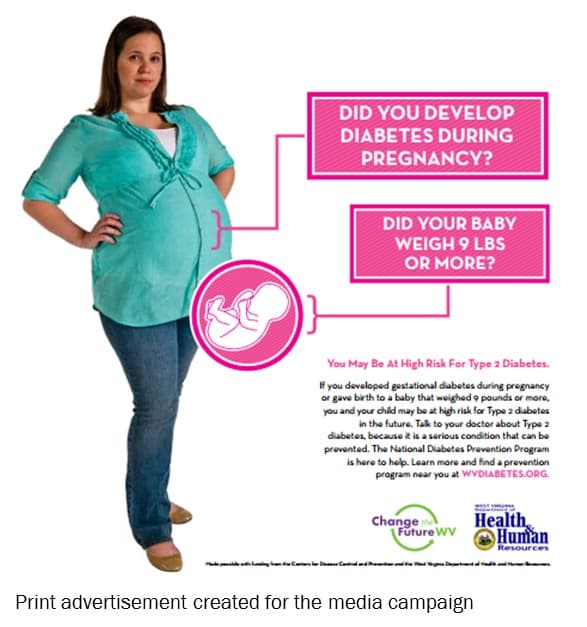Raising Healthcare Provider Awareness of Prediabetes & Diabetes Prevention

Submission Date: September 2014
Entry Type: Case Study
State/Territory Submitted on the Behalf of: West Virginia
States/Territories Involved: West Virginia
Domain Addressed:Community-Clinical Linkages, Environmental Approaches
Public Health Issue:In WV, the diabetes prevalence is 13% and the prediabetes prevalence is 8.6%. Without lifestyle changes to improve their health, 15 – 30% of people with prediabetes will develop type 2 diabetes within five years.
The Diabetes Prevention Program research study showed that making modest behavior changes helped participants lose 5 – 7% of their body weight and reduced the risk of developing type 2 diabetes by 58% in people with prediabetes.
Healthcare providers do not always know how to best recognize and treat prediabetes. Raising awareness of prediabetes and the National Diabetes Prevention Program’s (National DPP) evidence-based lifestyle change program among healthcare providers can promote increased identification of individuals with prediabetes and facilitate provider referral to the lifestyle change program.
Project Objectives:To increase the number of primary care centers whose staff receive education about prediabetes and CDC-recognized lifestyle change programs from 0-16.
To increase the number of primary care centers which identify patients at risk for developing diabetes from 0-4.
Program Action:Increasing provider awareness about diabetes prevention is a priority for the West Virginia Diabetes Prevention and Control Program (DPCP). To educate healthcare providers about how to recognize and treat prediabetes, the DPCP presented on prediabetes and the evidence-based lifestyle change program. The DPCP modified existing PowerPoint slides to create three slide decks for use at in-person presentations and webinars. The presentation format was largely discussion-based accompanied by slides. Posters, referral forms, and CDC-developed provider brochures were distributed to attendees. Most presentations focused on awareness of prediabetes, the evidence-based lifestyle change program, and healthcare provider referral. The DPCP created an academic poster which was displayed at several conferences, showcasing the results of a pilot lifestyle change program provided to West Virginia Bureau for Public Health staff. The DPCP gave PowerPoint and poster presentations at numerous conferences, meetings, and webinars. The DPCP contracted with the West Virginia Primary Care Association (WV PCA) to develop and implement a healthcare provider webinar. Using a variety of formats, the DPCP was able to reach healthcare providers, insurers, employers, county health department staff, health and quality improvement professionals, and health center administrators and staff.
An article about using electronic health records (EHRs) to identify patients at risk for diabetes was published in the online journal Perspectives in Health Information Management. The article demonstrated the viability of patient registry software for identification of individuals at risk for diabetes.
In addition, the DPCP created a media campaign, which included TV, radio, print, and billboard advertisements. While the campaign was targeted to individuals at risk for diabetes, the advertisements reinforced information healthcare providers learned through the DPCP presentations. The media campaign increased awareness of risk factors and advertised the DPCP’s website (http://www.wvdiabetes.org), which contained prediabetes information and evidence-based lifestyle change program listings. The printed advertisements used bright colors to draw attention to diabetes risk factors and listed the evidence-based lifestyle change program as a solution. Two versions were created, highlighting general and pregnancy-specific risk factors.
“The efforts led by the WV DPCP not only helped to raise awareness of diabetes but importantly raised awareness of and facilitated linkages with local programs designed to support diabetes prevention.” – Adam Baus, WVU OHSR
State Health Department Roles
- Developed tools to educate healthcare providers, administrators, and other health center staff
- Delivered presentations to Federally Qualified Health Centers, Free Clinics, and other groups and organizations
- Distributed CDC marketing materials among community clinics and organizations
- Educated health center CEOs and COOs about the evidence-based lifestyle change program and associated payment models/strategies
- Collaborated with the state’s media contractor to develop and produce a diabetes prevention media campaign
Partners
- West Virginia University Office of Health Services Research
- West Virginia Primary Care Association
- Health centers
- Media contractor for West Virginia Department of Health and Human Resources
- 5 Healthcare system partners
- 9 Healthcare delivery sites
- 37 Primary care health providers
- 16,332 Adult patients served by these providers
- 4,340 Radio commercials
- 62 Radio stations
- 70 Spots per station
- 1 million people reached through radio campaign
Factors Supporting Success
- Dedicated Funding: $64,000
- Existing healthcare provider educational tools
- Previous experience with successful state diabetes and smoking awareness campaigns
- Partnerships with West Virginia University Office of Health Services Research (WVU OHSR) and health centers
- Formed partnerships with health systems and health centers
- Utilized partnerships with organizations representing healthcare providers to expand reach
- Discussion-based format captured the audience’s attention by making the presentation interactive and relevant
- Strengthened alliance with WV PCA to focus attention on prediabetes among health centers and providers/staff
Challenges and Solutions
Challenge: Providers wanted to know the location of evidence-based lifestyle change program sites in their area; the DPCP did not have a coordinated way to collect or provide this information
Solution: Evidence-based lifestyle change program providers were given the option to include their information on a Google Map created by a local health department and linked to the DPCP’s website
Challenge: Limited number of DPCP staff and lack of time among clinic staff/providers was a barrier to delivering presentations
Solution: Meetings were scheduled as soon as both partners were able to meet
Challenge: State contracting to develop a provider webinar was delayed
Solution: Worked with WV PCA to discuss options for delivering provider education due to delays
The WV Division of Health Promotion & Chronic Disease will bring together diabetes prevention stakeholders to assess progress and determine WV’s next steps.
https://www.chronicdisease.org/?NDPP_WV
Diabetes
State Contact Information:
WV
Jessica Wright and Tony Leach (Tony.M.Leach@wv.gov)
West Virginia Diabetes Prevention and Control Program
304-356-4193
Jessica.G.Wright@wv.gov
